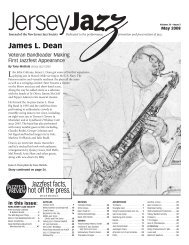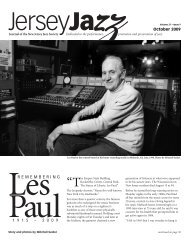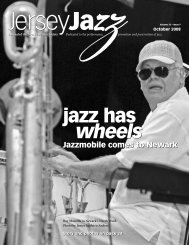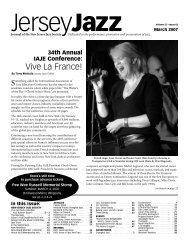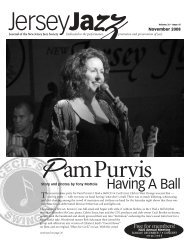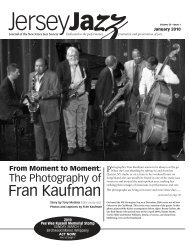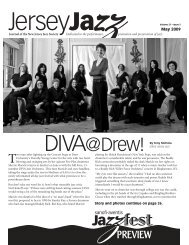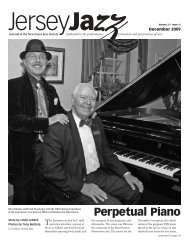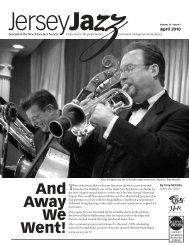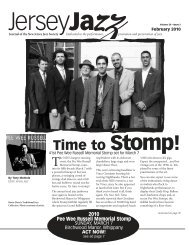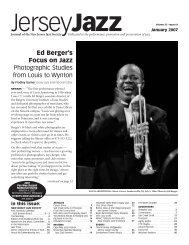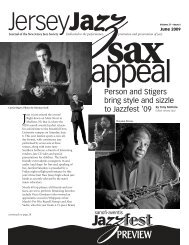<strong>Jersey</strong>Articles<strong>Jazz</strong>Big Band in <strong>the</strong> SkyBy Fradley Garner<strong>Jersey</strong> <strong>Jazz</strong> International Editor■ Buddy Schutz, 92, drummer,p<strong>hot</strong>ographer, teacher, Union City, NJ,Nov. 23, 1914 — <strong>New</strong>ton, NJ, Feb. 24,2007. Adolph (Buddy) Schutz, perhaps <strong>the</strong>last of <strong>the</strong> Swing era big name banddrummers and aveteran of some149 documentedrecordings, enjoyed acareer that spannedover 70 years, driving<strong>the</strong> orchestras ofGlenn Miller, BennyGoodman, JimmyDorsey and Vincent Lopez and spotlightedwith <strong>the</strong> Dorsey band in “Lost in <strong>the</strong>Harem” and o<strong>the</strong>r movies. Schutz, a TomsRiver resident, died in a hospice after astroke. “Need a refresher on Buddy?” asked<strong>the</strong> drummer Don Robertson, in his featurein Not So Modern Drummer magazine.“Think of <strong>the</strong> Benny Goodman and MarthaTilton recording of ‘And <strong>the</strong> Angels Sing’with that tricky Fralich-time Ziggy Elmanchorus after <strong>the</strong> vocal. A lot of peoplethought that was Gene Krupa. Or jump afew years to <strong>the</strong> Jimmy Dorsey Orchestraand all those great Helen O’Connell/BobEberle vocal specials. What do <strong>the</strong>y have incommon? Buddy Schutz in <strong>the</strong> driver’s seat.”Robertson also wrote a biographical articleon Buddy on <strong>the</strong> occasion of his 90thbirthday that was published in <strong>the</strong>December 2004 issue of <strong>Jersey</strong> <strong>Jazz</strong> (Pg. 20 –21) and in several o<strong>the</strong>r publications.■ Leroy Jenkins, 74, violinist, reeds player,composer, educator, Chicago, IL, Mar. 11,1932 – <strong>New</strong> York, NY, Feb. 24, 2007. LeroyL. Jenkins, at about age 7, was playing violinrecitals at one of Chicago’s biggest Baptistchurches, accompanied by Ruth Jones, ayoung pianist better known in years tofollow as <strong>the</strong> blues queen DinahWashington. Leroy grew up to become apoll-winner on that instrument, a musiceducator in <strong>the</strong> South, and composer ofworks including an opera performed at <strong>the</strong>Metropolitan in <strong>New</strong> York and music forThe Mo<strong>the</strong>r of Three Sons, staged by a dancecompany at <strong>New</strong> York City Opera in 1991.He was 74 when he died in Brooklyn of lungcancer complications. Jenkins played <strong>the</strong>alto saxophone in high school and won abassoon scholarship to Florida A&MUniversity, although he returned <strong>the</strong>re to <strong>the</strong>saxophone and clarinet and took up <strong>the</strong>violin again. Back in Chicago, he joined amusicians’ cooperative, expanding on <strong>the</strong>structures of Ornette Coleman and CecilTaylor in his compositions. He formed anassociation with three o<strong>the</strong>r avant-gardemusicians. In 1969, he and Anthony Braxtonand Leo Smith moved to Paris where <strong>the</strong>yforged a Continental reputation. Back in<strong>New</strong> York in 1970, Jenkins moved in withOrnette Coleman, and formed a trio called<strong>the</strong> Revolutionary Ensemble that stayedtoge<strong>the</strong>r for six years. Writing for classicalensembles, he also led a kind of jazz-funkgroup, Sting. He recorded his own work foran Italian label, Black Saint. His interestsshifted back to academic music and heworked often with Muhal Richard Abramsand o<strong>the</strong>r old classical colleagues. He alsoAl Viola. © Ray Avery, CTSIMAGES.COMwrote pieces that were performed by <strong>the</strong>Brooklyn Philharmonic, <strong>the</strong> Kronos StringQuartet and o<strong>the</strong>r chamber groups.■ Al Viola, 87, guitarist and mandolinplayer, Brooklyn, NY, June 16, 1919 –Studio City, CA, Feb. 21, 2007. FrankSinatra, after doing a free-form, vocal-andguitarduet of Cole Porter’s “Night and Day”with Al Viola, pronounced him “one of <strong>the</strong>world’s great guitarists.” Viola’s employer fornearly a quarter century added: “I think heplays beautifully. As a matter of fact, if youweren’t looking at him, you’d swear he wasan octopus.” The 87-year-old mastermusician succumbed to cancer at home andclose to his wife, Glenna, and <strong>the</strong>ir two sons,Dan and Jeff. “Al worked until three weeksbefore his death,” Glenna Viola told <strong>Jersey</strong><strong>Jazz</strong>. He played “only gigs that he wanted todo,” she said. Born into a musical family inBrooklyn, Albert Viola was started on both<strong>the</strong> mandolin and guitar by his bro<strong>the</strong>r, andtaught himself from early life on. He playedwith a violinist friend at local Chinese restaurants.“My mo<strong>the</strong>r thought I was robbing<strong>the</strong> bank because I was bringing home $22 aweek during <strong>the</strong> De<strong>press</strong>ion,” he was quotedby <strong>the</strong> Associated Press. During World WarII he played inan Army bandin Sacramento.There he teamedup with <strong>the</strong>pianist PageCavanaugh andbassist LloydPratt. The PageCavanaugh Trioplayed at leadingLos Angelesnightclubs, touringin 1947–1949and recordinghits like “Walkin’My Baby Back16April 2007 <strong>Jersey</strong><strong>Jazz</strong>
<strong>Jersey</strong>Articles<strong>Jazz</strong>Home” and backing <strong>the</strong> singer Mel Tormeon Victor releases. Viola alone backed JulieLondon on <strong>the</strong> Liberty LP, Lonely Girl andbacked June Christy and o<strong>the</strong>r singers andinstrumentalists such as Terry Gibbs andLaurindo Almeida. The trio were guests onmany TV shows. They could be seen in <strong>the</strong>movies A Song Is Born and Romance on <strong>the</strong>High Seas and heard in <strong>the</strong> backgroundmusic for o<strong>the</strong>r movies. Viola worked brieflyin <strong>the</strong> big bands of Ray Anthony and HarryJames in <strong>the</strong> mid-’50s, but small groupswere his bag. Frank Sinatra’s respect wasreturned. “I had to turn down a lot of workto go on a world tour with him for 10weeks,” Viola said in 1994, “but I liked wha<strong>the</strong> was puttin’ down.” What he liked bestwas Sinatra’s unpredictability. “Although hewasn’t known as a jazz singer, he ad-libbedlike one and wouldn’t sing a song <strong>the</strong> sameway twice.” Glenna Viola, “his biggest fan,”went with her husband to every gig. “Hehad a routine of doing <strong>the</strong> Four PointsSheraton on <strong>the</strong> first Tuesday of everymonth with a trio. The last Friday of everymonth he worked a supper club here in <strong>the</strong>valley with his quartet. That was his last gig,on Friday, January 26. On Monday <strong>the</strong> painstarted, and each day he grew weaker. Allwe could do was to keep him as comfortableas possible.”■ Eldee Young, 71, bassist, cellist, singer,Chicago, IL, Jan. 7, 1936 – Thailand, Feb.12, 2007. “Though he stood just 5 feet1 inch,” wrote <strong>the</strong> Chicago Tribune, “jazzbassist Eldee Young sounded as big as alloutdoors.” His lavish bass lines in <strong>the</strong>Ramsey Lewis Trio helped blow <strong>the</strong> mostfamous Chicago threesome in modern jazzhistory out of <strong>the</strong> Windy City and around<strong>the</strong> world. Young died at 71, apparently of aheart attack, while on tour in <strong>the</strong> Far East.Ramsey Lewis called him “<strong>the</strong> anchor” of histrio, playing an instrument “almost twice astall as him” in so animated a way that“people absolutely lovedhim.” The little showmanwith <strong>the</strong> fat sound wouldwalk away from his bassto play cello and sometimessing, in <strong>the</strong> mannerof early 20th-century jazzmusicians, and audiencesate it up. But Young wasalso what <strong>the</strong> Chicago bandleader MarshallVente called a “consummate musician” whohit <strong>the</strong> right notes with <strong>the</strong> right touch. Hisdecade with <strong>the</strong> trio in 1956–1966 madehim famous, but when <strong>the</strong> trio broke up hebounced back to co-lead groups withRamsey’s drummer, Redd Holt. The 1980soften found him performing in Singapore,Vietnam, India, Malaysia and o<strong>the</strong>r Asianlands. Young can be heard on CDs withLewis (Argo, Cadet, Chess), John Young(Delmark), Eden Atwood (Concord).■ Peggy Gilbert, 102, saxophonist andbandleader, women musicians’ advocate,Sioux City, IA, Jan. 7, 1905 – Burbank,CA, Feb. 12, 2007. In <strong>the</strong> early 1920s, whenMargaret Knechtges (Peggy Gilbert) was inhigh school in Sioux City, it was all rightfor girls to play <strong>the</strong> piano, violin or harp ingroups, but not a wind instrument — andcertainly not <strong>the</strong> saxophone. Bitten by <strong>the</strong>jazz bug, Knechtges took up <strong>the</strong> tenor sax.After graduation in 1923, she founded TheMelody Girls, first in a series of all-female<strong>hot</strong> jazz and swing bands that she continuedto lead, with some gaps, into her 90s.Gilbert, whose last residence was in StudioCity, died of hip surgery complications at aBurbank hospital. She was 102 and clear ofmind, with an astounding memory fornames, dates and places. Knechtges adoptedher mo<strong>the</strong>r’s maiden name when she turnedprofessional. She arranged <strong>the</strong> music andhandled bookings for her bands, which wereseen in several movies in <strong>the</strong> 1930s. In 1937,Peggy Gilbert and Her Orchestra openedThe Second HollywoodSwing Concert at <strong>the</strong>Palomar ballroom, on ano<strong>the</strong>rwise all-male bill thatincluded Benny Goodman,Stuff Smith, Louis Prima,Ben Pollack and Les Hite.The prejudice againstwomen musicians peakedafter an article, “Why Women Musicians AreInferior,” appeared in a 1938 issue of DownBeat. She wrote a retort that <strong>the</strong> magazineheadlined, “How Can You Blow a Horn in aBrassiere?” That “sort of set her as <strong>the</strong>national advocate for women jazz musicians,”her friend and biographer JeanniePool was quoted in <strong>the</strong> Los Angeles Times.A documentary video, Peggy Gilbert andHer All-Girl Band, is available from Dr. Poolat jaygaylemusic@yahoo.com, or telephone912-224-0144. Gilbert was buried at ForestLawn in Hollywood Hills.■ Whitney Balliett, 80, jazz writer andauthor, Manhattan, NY, April 17, 1926 –Feb. 1, 2007. In a profile of Pee Wee Russell,“Even His Feet Look Sad,” Whitney Balliettword-painted “A tall, close packed, slightlybent man” with “a wry, wandering face,dominated by a generous nose…A heavytrellis of wrinkles held his features in place.”Balliett, for nearly a half-century The <strong>New</strong>Yorker jazz columnist who set out, oftentongue-in-cheek, to share <strong>the</strong> sensualqualities of a performance ra<strong>the</strong>r thancritique it, died of cancer at his Manhattanhome. He was 80. Balliett was “<strong>the</strong> greatestprose stylist to ever apply his writing skillsto jazz,” said Dan Morgenstern, director of<strong>the</strong> Institute of <strong>Jazz</strong> Studies at Rutgers-<strong>New</strong>ark. Like <strong>the</strong> writers James Thurber andS.J. Perelman, “he was part of that banquetof literature from which <strong>the</strong> magazine wasmade,” Steve Voce wrote in The Independentof London. Balliett’s name was on morethan 550 articles and many more unsignedcontinued on page 18April 2007 <strong>Jersey</strong><strong>Jazz</strong> 17



